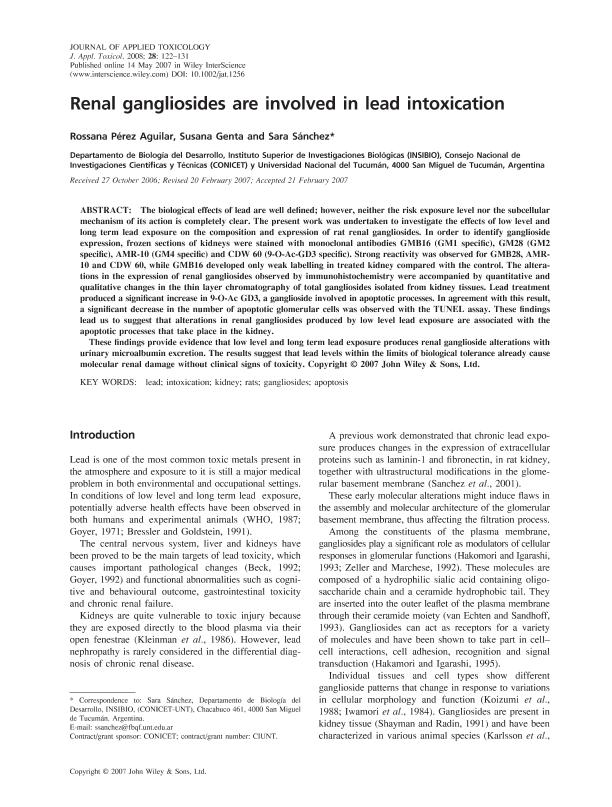Mostrar el registro sencillo del ítem
dc.contributor.author
Pérez Aguilar, Rossana Cristina

dc.contributor.author
Genta, Susana Beatriz de Fátima

dc.contributor.author
Sanchez, Sara Serafina del V.

dc.date.available
2018-12-04T13:32:45Z
dc.date.issued
2008-03
dc.identifier.citation
Pérez Aguilar, Rossana Cristina; Genta, Susana Beatriz de Fátima; Sanchez, Sara Serafina del V.; Renal gangliosides are involved in lead intoxication; John Wiley & Sons Ltd; Journal of Applied Toxicology; 28; 2; 3-2008; 122-131
dc.identifier.issn
0260-437X
dc.identifier.uri
http://hdl.handle.net/11336/65687
dc.description.abstract
The biological effects of lead are well defined; however, neither the risk exposure level nor the subcellular mechanism of its action is completely clear. The present work was undertaken to investigate the effects of low level and long term lead exposure on the composition and expression of rat renal gangliosides. In order to identify ganglioside expression, frozen sections of kidneys were stained with monoclonal antibodies GMB16 (GM1 specific), GM28 (GM2 specific), AMR-10 (GM4 specific) and CDW 60 (9-0-Ac-GD3 specific). Strong reactivity was observed for GMB28, AMR-10 and CDW 60, while GMB16 developed only weak labelling in treated kidney compared with the control. The alterations in the expression of renal gangliosides observed by immunohistochemistry were accompanied by quantitative and qualitative changes in the thin layer chromatography of total gangliosides isolated from kidney tissues. Lead treatment produced a significant increase in 9-O-Ac GD3, a ganglioside involved in apoptotic processes. In agreement with this result, a significant decrease in the number of apoptotic glomerular cells was observed with the TUNEL assay. These findings lead us to suggest that alterations in renal gangliosides produced by low level lead exposure are associated with the apoptotic processes that take place in the kidney. These findings provide evidence that low level and long term lead exposure produces renal ganglioside alterations with urinary microalbumin excretion. The results suggest that lead levels within the limits of biological tolerance already cause molecular renal damage without clinical signs of toxicity. Copyright © 2007 John Wiley & Sons, Ltd.
dc.format
application/pdf
dc.language.iso
eng
dc.publisher
John Wiley & Sons Ltd

dc.rights
info:eu-repo/semantics/openAccess
dc.rights.uri
https://creativecommons.org/licenses/by-nc-sa/2.5/ar/
dc.subject
Apoptosis
dc.subject
Gangliosides
dc.subject
Intoxication
dc.subject
Kidney
dc.subject
Lead
dc.subject
Rats
dc.subject.classification
Otras Ciencias Biológicas

dc.subject.classification
Ciencias Biológicas

dc.subject.classification
CIENCIAS NATURALES Y EXACTAS

dc.title
Renal gangliosides are involved in lead intoxication
dc.type
info:eu-repo/semantics/article
dc.type
info:ar-repo/semantics/artículo
dc.type
info:eu-repo/semantics/publishedVersion
dc.date.updated
2018-11-13T14:05:13Z
dc.journal.volume
28
dc.journal.number
2
dc.journal.pagination
122-131
dc.journal.pais
Reino Unido

dc.journal.ciudad
Londres
dc.description.fil
Fil: Pérez Aguilar, Rossana Cristina. Consejo Nacional de Investigaciones Científicas y Técnicas. Centro Científico Tecnológico Conicet - Tucumán. Instituto Superior de Investigaciones Biológicas. Universidad Nacional de Tucumán. Instituto Superior de Investigaciones Biológicas; Argentina
dc.description.fil
Fil: Genta, Susana Beatriz de Fátima. Consejo Nacional de Investigaciones Científicas y Técnicas. Centro Científico Tecnológico Conicet - Tucumán. Instituto Superior de Investigaciones Biológicas. Universidad Nacional de Tucumán. Instituto Superior de Investigaciones Biológicas; Argentina
dc.description.fil
Fil: Sanchez, Sara Serafina del V.. Consejo Nacional de Investigaciones Científicas y Técnicas. Centro Científico Tecnológico Conicet - Tucumán. Instituto Superior de Investigaciones Biológicas. Universidad Nacional de Tucumán. Instituto Superior de Investigaciones Biológicas; Argentina
dc.journal.title
Journal of Applied Toxicology

dc.relation.alternativeid
info:eu-repo/semantics/altIdentifier/doi/https://dx.doi.org/10.1002/jat.1256
dc.relation.alternativeid
info:eu-repo/semantics/altIdentifier/url/https://onlinelibrary.wiley.com/doi/abs/10.1002/jat.1256
Archivos asociados
